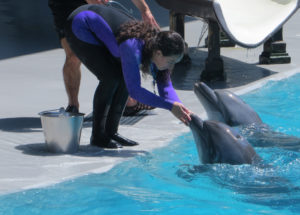The good news is that Bill S-203, which originated more than three years ago, cleared the Senate last week. It still has to be approved by the elected House of Commons. If passed, it will end the practice of keeping cetaceans – whales, dolphins and porpoises – in captivity, with rare exceptions to the benefit of the animals. There are only two Canadian facilities that actually do keep captive cetaceans. I’ve recently written about one, Marineland, most familiar to me even though I’ve visited it only twice in over thirty years. That’s because I hate to see animals kept under the conditions I recently described (see: here and here).
But, as if studying the tactics of U.S. President Donald Trump, opponents of the bill have avoided the issue by attacking, with lies, those of us in favor of the bill. For example, Marineland claims:
“The bill and debate around it has been highly emotional, lacking in fact-based or science-based analysis and mired in unnecessary conflict incited by radical animal rights groups from the United States.”


I reference President Trump not to be political, but to make the point that when truth can’t be countered by truth, we should not let lies sway opinion.
As for the “animal rights” label, what exactly is meant? The term is so overused as to be useless. We’re all animals but “rights” are a construct, an invention, serving to define civilization. I seek to confer, through law, the “right” of cetaceans to not be confined in aquariums primarily in service, in Marineland’s case, of profiteering through the provision of entertainment. Period, full stop.
Keep Wildlife in the Wild,
Barry
